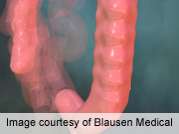Prevalence, predictors of interval colorectal cancer ID'd

(HealthDay) -- A variety of procedural and biologic factors contribute to the development of interval colorectal cancers, seen in 7.2 percent of Medicare beneficiaries, according to a study published in the June 15 issue of Cancer.
Gregory S. Cooper, M.D., of the University Hospitals Case Medical Center in Cleveland, and colleagues identified 57,839 patients aged 69 and older diagnosed with colorectal cancer from the linked Surveillance, Epidemiology, and End Results-Medicare database. The frequency and predictors of colorectal cancer cases that develop after a negative colonoscopy (interval cancer) were assessed.
The researchers found that the overall prevalence of interval cancer was 7.2 percent. Proximal tumor location, increased comorbidity, a previous diagnosis of diverticulosis, and having previously undergone a polypectomy all correlated significantly with interval cancer. At the level of the endoscopist, significant risk factors for interval cancer included lower polypectomy rate, higher colonoscopy volume, and specialty other than gastroenterology.
"A significant proportion of patients developed interval colorectal cancer, particularly in the proximal colon," the authors write. "Contributing factors likely included both procedural and biologic factors, emphasizing the importance of meticulous examination of the mucosa."
More information:
Abstract
Full Text (subscription or payment may be required)
Copyright © 2012 HealthDay. All rights reserved.















